Caryn’s Thoughts
Written by guest writer: Corrie Petersen

 What a difference a year can make. Today is my mom, Caryn Schulenberg’s birthday and I’m the lucky one to write her post this year. Every day and every year things change. We never know what to expect next, but that’s ok because surprises are always fun.
What a difference a year can make. Today is my mom, Caryn Schulenberg’s birthday and I’m the lucky one to write her post this year. Every day and every year things change. We never know what to expect next, but that’s ok because surprises are always fun.
This last year has been full of changes in our family. The true blessing is that my mom has been here to be a part of all the changes. She was able to help welcome two more great grandsons, courtesy of my two sons, Chris and Josh Petersen and their wives, Karen and Athena. She was able to take several vacations with my dad, Bob 
 Schulenberg and most recently she was able to help my great aunt, Sandy Pattan in her time of need.
Schulenberg and most recently she was able to help my great aunt, Sandy Pattan in her time of need.
While I’m sure she didn’t plan to be a caregiver again, she wouldn’t have it any other way. Caregiving is in her heart, and she is very good at it, I might add. She was a caregiver for a very long time with her parents, Allen and Collene Spencer; my dad’s parents, Walt and Joann Schulenberg; and sister, Brenda Schulenberg. I have to wonder if choosing to help my Great Aunt Sandy was a blessing in disguise for both of them…a time of victory, healing, and reconnection.

 Mom has been retired for five years now, and she is still so busy. She finds time to walk nine miles every day, write her daily blog posts, read her Bible and go to church, and spend time with her family. She and my dad go to the Black Hills over the Independance Day week to go hiking, and they take a trip to Thermopolis each year around the time of their anniversary. They also try to get to Washington every other year to visit my sister, Amy Royce, her husband Travis, and her kids, Shai and Caalab. Oh…and she bowls once a week with my dad. Boy, that makes me tired just thinking about it, but that’s her life and she wouldn’t want it to be any different.
Mom has been retired for five years now, and she is still so busy. She finds time to walk nine miles every day, write her daily blog posts, read her Bible and go to church, and spend time with her family. She and my dad go to the Black Hills over the Independance Day week to go hiking, and they take a trip to Thermopolis each year around the time of their anniversary. They also try to get to Washington every other year to visit my sister, Amy Royce, her husband Travis, and her kids, Shai and Caalab. Oh…and she bowls once a week with my dad. Boy, that makes me tired just thinking about it, but that’s her life and she wouldn’t want it to be any different.
Today is my mom’s birthday and I hope she has the best day ever. I love you to the moon and back, mom.

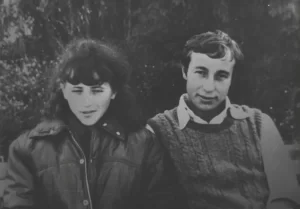 On April 26, 1986, an explosion in the Number 4 reactor of the Chernobyl Nuclear Power Plant, near the city of Pripyat in the north of the Ukrainian SSR, close to the border with the Byelorussian SSR, in the Soviet Union. So began what is considered the worst nuclear disaster in history. The Chernobyl disaster is one of only two nuclear energy accidents that was rated at seven, which is maximum severity on the International Nuclear Event Scale. The other one was the 2011 Fukushima nuclear accident in Japan, which of course, hadn’t happened yet. The cost of this disaster would be an enormous cost an estimated 18 billion roubles, which is roughly US$83 billion today. The initial emergency response and subsequent mitigation efforts involved more than 500,000 personnel. With all that, it is considered the worst nuclear disaster in history. Strange how the 4th worst disaster can also be considered the worst. I suppose it is in the cost to mitigate the damage and loss of life.
On April 26, 1986, an explosion in the Number 4 reactor of the Chernobyl Nuclear Power Plant, near the city of Pripyat in the north of the Ukrainian SSR, close to the border with the Byelorussian SSR, in the Soviet Union. So began what is considered the worst nuclear disaster in history. The Chernobyl disaster is one of only two nuclear energy accidents that was rated at seven, which is maximum severity on the International Nuclear Event Scale. The other one was the 2011 Fukushima nuclear accident in Japan, which of course, hadn’t happened yet. The cost of this disaster would be an enormous cost an estimated 18 billion roubles, which is roughly US$83 billion today. The initial emergency response and subsequent mitigation efforts involved more than 500,000 personnel. With all that, it is considered the worst nuclear disaster in history. Strange how the 4th worst disaster can also be considered the worst. I suppose it is in the cost to mitigate the damage and loss of life.
Volodymyr Pavlovych Pravyk was a Soviet firefighter, was born in the town of Chernobyl on June 13, 1962. His mother, Natalia Ivanova Pravyk, was a nurse, and his father, Pavel Opanasovich Pravyk, a construction worker. Pravyk took charge of the initial efforts to extinguish fires following the Chernobyl Disaster. I don’t know what measures were taken to protect the workers from radiation exposure, but I would expect that it was little to no protection. I would also expect that the equipment they did have was not what it needed to be to save them from radiation poisoning. After the event was over, Pravyk was hospitalized with acute radiation syndrome. For him, any improvements in protection would come too late. He died on May 11, 1986, just sixteen days later. Even though they could not save him, they knew that his actions were heroic. Pravyk was posthumously awarded the Hero of the Soviet Union and the Order of Lenin by the Soviet Union, and later the Ukrainian Star For Courage (later known as the Order for Courage) in recognition of his efforts.
It was later determined that a routine test at the power plant had gone horribly wrong, causing two massive 
 explosions that blew the 1,000-ton roof off one of the plant’s reactors. The explosions released 400 times more radiation than the atomic bomb dropped on Hiroshima. The disaster killed two workers in the initial explosions. Within months, at least 28 more would be dead by acute radiation exposure. Thousands of people would eventually show signs of health effects from the fallout, including cancer.
explosions that blew the 1,000-ton roof off one of the plant’s reactors. The explosions released 400 times more radiation than the atomic bomb dropped on Hiroshima. The disaster killed two workers in the initial explosions. Within months, at least 28 more would be dead by acute radiation exposure. Thousands of people would eventually show signs of health effects from the fallout, including cancer.
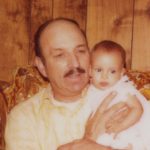
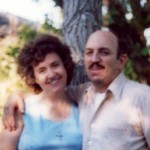 Since my Dad, Allen Spencer’s passing, our family has grown more than he probably ever could have imagined. He would be so pleased with the new spouses and all the new great great grandchildren he and my mom, Collene Spencer have now. Mom and Dad loved their family, and they always thought of children as a blessing from God. Dad loved playing with the little kids. He didn’t even have to get out of his chair. He sat in the kitchen, right beside the door. They kids would run past him while trying not to get swatted. Dad on the other hand tried to swat them before they could get past him. I can’t say who the biggest winner or loser was, but with all the loud screams and laughter, Mom would eventually get enough of the noise, and tell Dad to stop…good naturedly, and often while laughing. Still, I’m sure the noise got annoying at times. The little kids we have now, will never know their great great grandparents, until they go to Heaven anyway, and I find that very sad. They miss so much.
Since my Dad, Allen Spencer’s passing, our family has grown more than he probably ever could have imagined. He would be so pleased with the new spouses and all the new great great grandchildren he and my mom, Collene Spencer have now. Mom and Dad loved their family, and they always thought of children as a blessing from God. Dad loved playing with the little kids. He didn’t even have to get out of his chair. He sat in the kitchen, right beside the door. They kids would run past him while trying not to get swatted. Dad on the other hand tried to swat them before they could get past him. I can’t say who the biggest winner or loser was, but with all the loud screams and laughter, Mom would eventually get enough of the noise, and tell Dad to stop…good naturedly, and often while laughing. Still, I’m sure the noise got annoying at times. The little kids we have now, will never know their great great grandparents, until they go to Heaven anyway, and I find that very sad. They miss so much.
My sisters and I will always be thankful for the wonderful parents we were blessed with. We always knew that no matter what mistakes we made, we always had their love. Dad was the problem solver. My early school years found me struggling with two subjects that would later become my favorites…Mathematics and History. Mom would tell me that there would be trouble when my dad got home. I think she thought I wasn’t applying 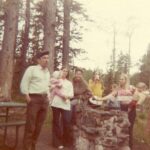
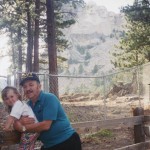 myself. Then, when my dad got home and saw the progress report, he said, “Well, I guess we will need to work on this.” We did work on it. Dad leading the way, and I ended up excelling in Mathematics, and while I did ok in history, it wasn’t my favorite subject until much later on…when I was a parent. Some people might think that I did better because my dad made me work harder, but I think he was the better teacher.
myself. Then, when my dad got home and saw the progress report, he said, “Well, I guess we will need to work on this.” We did work on it. Dad leading the way, and I ended up excelling in Mathematics, and while I did ok in history, it wasn’t my favorite subject until much later on…when I was a parent. Some people might think that I did better because my dad made me work harder, but I think he was the better teacher.
My dad loved to travel, and wanted to show his girls just how wonderful this nation we lived in really was. We traveled and camped out every summer. When we went back to school and the teachers asked what we had done over the summer, we always told them about our trips. The teachers told us we were blessed to get to go so many places…and we were. Most of us have been to almost all the 50 states, with just a few exceptions, but there is still time for us, so that could change. We definitely got our love of travel from our parents, and for that we are all grateful. It is something that has enriched our lives greatly.
Of course, we also got our faith from our parents. No matter what things we faced, we knew that God was with us and that everything would be ok. We went to church regularly, and we watched our parents use their faith in 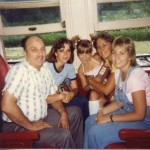
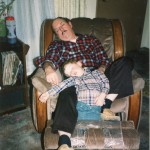 every situation. We will always be thankful for that Christian upbringing. It shaped the strong women we have become. These days, our upbringing continues to make us the people we are. We try to be kind and loving, just like our parents. If we can grow to be even half the people they were, I would say that they were successful in raising us. Today would have been my dad’s 100th birthday. I wish he had been able to be here to celebrate with us. Nevertheless, today we celebrate his life, and we thank God for giving him to us. Happy birthday in Heaven, Dad. We love and miss you every day and very much.
every situation. We will always be thankful for that Christian upbringing. It shaped the strong women we have become. These days, our upbringing continues to make us the people we are. We try to be kind and loving, just like our parents. If we can grow to be even half the people they were, I would say that they were successful in raising us. Today would have been my dad’s 100th birthday. I wish he had been able to be here to celebrate with us. Nevertheless, today we celebrate his life, and we thank God for giving him to us. Happy birthday in Heaven, Dad. We love and miss you every day and very much.
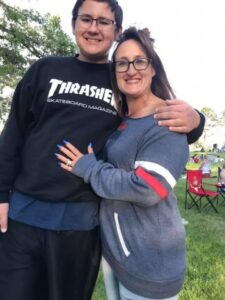
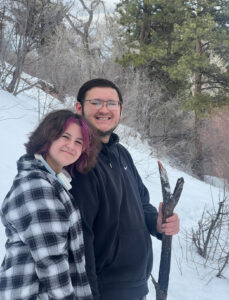 My grandnephew, Zack Spethman is such a sweet young man. He always has been. Since he was a little boy, Zack was a hugger. It’s a rare trait in a boy, especially as they get to the teenage years, to always hug the people they love. So many boys are embarrassed by aunts, uncles, and even parents who want to give them a hug. These boys are coming into manhood, after all. They have to act macho, or so many of them think, but not Zack. He is so confident in himself, that he feels totally comfortable hugging the people he loves. It really makes you feel special to know that this boy, now a man, seeks you out to tell you that he loves you. Zack is a very social person, and loves hanging out with all of his family and friends.
My grandnephew, Zack Spethman is such a sweet young man. He always has been. Since he was a little boy, Zack was a hugger. It’s a rare trait in a boy, especially as they get to the teenage years, to always hug the people they love. So many boys are embarrassed by aunts, uncles, and even parents who want to give them a hug. These boys are coming into manhood, after all. They have to act macho, or so many of them think, but not Zack. He is so confident in himself, that he feels totally comfortable hugging the people he loves. It really makes you feel special to know that this boy, now a man, seeks you out to tell you that he loves you. Zack is a very social person, and loves hanging out with all of his family and friends.
Zack has grown into a tall man now. He towers over the short women in our family, which is most of us. His mom, Jenny Spethman tells me that he is a momma’s boy, but she doesn’t mean that in a negative way. He and Jenny share a number of interests like hiking and climbing. 
 Zack is always up for a hike with his mom, and she likes it, because not everyone wants to go. Nevertheless, Zack will always go climbing and hiking with her. He is also very good to his little sister, Aleesia, helping her with whatever she needs help with, and helping her with climbing to make sure she is safe. While he likes hanging out with his mom, Zack also like the guy things…especially hunting with his dad, Steve Spethman, and his brothers, Xander and Isaac. The guys are very good hunters, and always get enough to supply the family with meat for the next year. The hunts are great financial blessings to their family.
Zack is always up for a hike with his mom, and she likes it, because not everyone wants to go. Nevertheless, Zack will always go climbing and hiking with her. He is also very good to his little sister, Aleesia, helping her with whatever she needs help with, and helping her with climbing to make sure she is safe. While he likes hanging out with his mom, Zack also like the guy things…especially hunting with his dad, Steve Spethman, and his brothers, Xander and Isaac. The guys are very good hunters, and always get enough to supply the family with meat for the next year. The hunts are great financial blessings to their family.
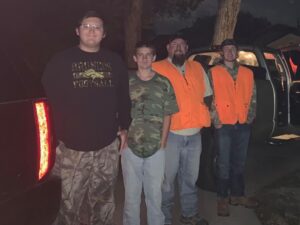
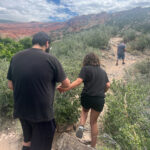 Zack is a smart kid. He was on the honor roll every quarter this year. With all the things Zack is good at, Trivia would not be something I would expect. In fact, Jenny says he has surprised everyone at how good he was at trivia. There is a lot more to Zack than sports and activities. He is a deep thinker too. He likes to reason things out, and he likes learning. I don’t know what his future plans are, but Zack can do anything he wants to do. Today is Zack’s 19th birthday. Happy birthday Zack!! Have a great day!! We love you!!
Zack is a smart kid. He was on the honor roll every quarter this year. With all the things Zack is good at, Trivia would not be something I would expect. In fact, Jenny says he has surprised everyone at how good he was at trivia. There is a lot more to Zack than sports and activities. He is a deep thinker too. He likes to reason things out, and he likes learning. I don’t know what his future plans are, but Zack can do anything he wants to do. Today is Zack’s 19th birthday. Happy birthday Zack!! Have a great day!! We love you!!
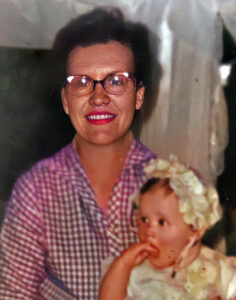
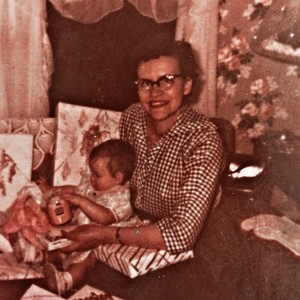 It’s not every day that someone turns 100 years old, but today, that can be said of my aunt, Doris Spencer. She is the last of my aunts and uncles on my dad’s side, and I’m sure it never occurred to her that she might achieve that grand age. Everyone marks the day they hit double digits, but very few people hit triple digits. Just imagine…living for a whole century. What changes she must have seen in all those years. In 1924, the life expectancy was 54.1 years. Of course, that was the average age that people were dying, not how long those born that year were expected to live. Still, Aunt Doris has far exceeded that number and is even beyond the current life expectancy, which is 73.33 years. The average income in 1924 was $2,196 a year, which made the cost of a new car ($265) and a house ($7,720) seem like a whole lot of money. A stamp cost 2 cents. Oh that we could have those pices with today’s income, but let’s face it, that isn’t even reasonable.
It’s not every day that someone turns 100 years old, but today, that can be said of my aunt, Doris Spencer. She is the last of my aunts and uncles on my dad’s side, and I’m sure it never occurred to her that she might achieve that grand age. Everyone marks the day they hit double digits, but very few people hit triple digits. Just imagine…living for a whole century. What changes she must have seen in all those years. In 1924, the life expectancy was 54.1 years. Of course, that was the average age that people were dying, not how long those born that year were expected to live. Still, Aunt Doris has far exceeded that number and is even beyond the current life expectancy, which is 73.33 years. The average income in 1924 was $2,196 a year, which made the cost of a new car ($265) and a house ($7,720) seem like a whole lot of money. A stamp cost 2 cents. Oh that we could have those pices with today’s income, but let’s face it, that isn’t even reasonable. 
At the time that Aunt Doris was born, Calvin Coolidge was President of the United States, and we had no vice-president from 1923 to 1925, that might seem odd, and in fact, it is unusual, but not unheard of. In fact, there were eighteen presidents who served all or part of their term with no vice-president, and four that served the whole term without a vice-president. Coolidge becme president when Warren Harding died suddenly in 1923. So he had no vice-president. He was re-elected in his own right in 1924, and could have run again in 1928, but chose not to. Of course, none of that made any difference to Aunt Doris, who was just a newborn then, but I’m sure she would find it interesting to note.
Aunt Doris and my Uncle Bill Spencer had three children, Pamela “Pam” (Spencer) Wendling in late 1954, William “Bill” Spencer Jr in 1959, and James “Jim” Spencer in 1962. She has also been blessed with five grandchildren, four great grandchildren and one bonus great granddaughter. She has had a happy life, and she 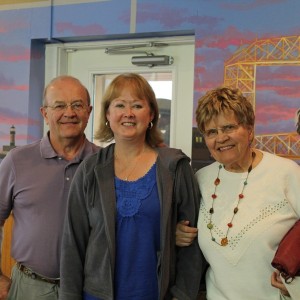
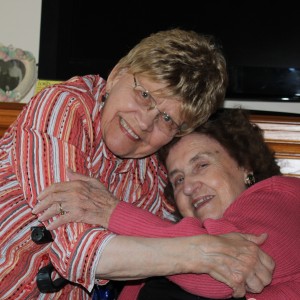 has always been a blessing to many people. She and my mom, Collene Spencer were best friends, and loved living across the yard from each other when my family lived in Superior, Wisconsin. When we moved to Casper, Wyoming, the friends really missed each other. I was so glad that my sister, Cheryl Masterson and I took Mom to Wisconsin to visit before she passed away in 2015. I know it meant so much to both of them. I am so glad we gave them that gift, and I’m so glad that my Aunt Doris has made it to triple digits. Today is Aunt Doris’ 100th birthday. Happy birthday Aunt Doris!! Have a wonderful day!! We love you!!
has always been a blessing to many people. She and my mom, Collene Spencer were best friends, and loved living across the yard from each other when my family lived in Superior, Wisconsin. When we moved to Casper, Wyoming, the friends really missed each other. I was so glad that my sister, Cheryl Masterson and I took Mom to Wisconsin to visit before she passed away in 2015. I know it meant so much to both of them. I am so glad we gave them that gift, and I’m so glad that my Aunt Doris has made it to triple digits. Today is Aunt Doris’ 100th birthday. Happy birthday Aunt Doris!! Have a wonderful day!! We love you!!
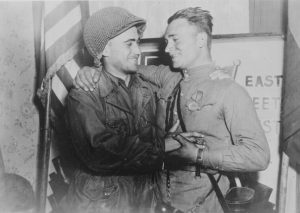 Sometimes, an event that potentially changed history, ends up getting little or no recognition. Thankfully, the picture that marked the event was taken, or the entire event might never have been noticed in history at all. This particular day is actually a very important day in the history of World War II, and therefore, the world. Elbe Day, which took place on April 25, 1945, is the day Soviet and American troops met at the Elbe River, near Torgau in Germany. This event marked an important step toward the end of World War II in Europe. If you have ever heard the saying, divide and conquer, you will know basically what happened on Elbe Day. A secret mission had been planned, and April 25, 1945, was the day it was carried out.
Sometimes, an event that potentially changed history, ends up getting little or no recognition. Thankfully, the picture that marked the event was taken, or the entire event might never have been noticed in history at all. This particular day is actually a very important day in the history of World War II, and therefore, the world. Elbe Day, which took place on April 25, 1945, is the day Soviet and American troops met at the Elbe River, near Torgau in Germany. This event marked an important step toward the end of World War II in Europe. If you have ever heard the saying, divide and conquer, you will know basically what happened on Elbe Day. A secret mission had been planned, and April 25, 1945, was the day it was carried out.
The plan was to have the Soviet army advance from the East, and the US Army advance from the West. The first contact between American and Soviet patrols occurred near Strehla exactly as planned, after First Lieutenant Albert Kotzebue, an American soldier, crossed the Elbe River in a boat with three men of an intelligence and reconnaissance platoon. Once they crossed to the east bank of the river, they met up with  forward elements of a Soviet Guards rifle regiment of the First Ukrainian Front, under the command of Lieutenant Colonel Alexander Gardiev. Later that day, another patrol under Second Lieutenant William Robertson with Frank Huff, James McDonnell and Paul Staub met a Soviet patrol commanded by Lieutenant Alexander Silvashko on the destroyed Elbe bridge of Torgau. When the two armies connected at the Elbe River, the cutting of Germany in half is accomplished. In doing so, the strength of the German army was severely weakened. The German army was split in two, just like the country was, and in the end, that split made it impossible for the Germans to really fight the war they were engaged in. It was the beginning of the end for them.
forward elements of a Soviet Guards rifle regiment of the First Ukrainian Front, under the command of Lieutenant Colonel Alexander Gardiev. Later that day, another patrol under Second Lieutenant William Robertson with Frank Huff, James McDonnell and Paul Staub met a Soviet patrol commanded by Lieutenant Alexander Silvashko on the destroyed Elbe bridge of Torgau. When the two armies connected at the Elbe River, the cutting of Germany in half is accomplished. In doing so, the strength of the German army was severely weakened. The German army was split in two, just like the country was, and in the end, that split made it impossible for the Germans to really fight the war they were engaged in. It was the beginning of the end for them.
Finally, on April 26, the commanders of the 69th Infantry Division of the First Army (United States) and the 58th Guards Rifle Division of the 5th Guards Army (Soviet Union) met at Torgau, southwest of Berlin. They knew that this moment was monumental, and it had to be documented. Arrangements were made for the 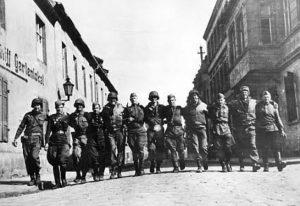 formal “Handshake of Torgau” photo to be taken of Robertson and Silvashko the following day, April 27. The Soviet, American, and British governments released simultaneous statements that evening in London, Moscow, and Washington, “reaffirming the determination of the three Allied powers to complete the destruction of the Third Reich.” They knew they must have victory at all costs.
formal “Handshake of Torgau” photo to be taken of Robertson and Silvashko the following day, April 27. The Soviet, American, and British governments released simultaneous statements that evening in London, Moscow, and Washington, “reaffirming the determination of the three Allied powers to complete the destruction of the Third Reich.” They knew they must have victory at all costs.
The fact that Elbe Day has never been an official holiday in any country, has not stopped people from looking to the day as something very special, and in the years after 1945 the memory of this friendly encounter gained new significance in the context of the Cold War between the United States and the Soviet Union.
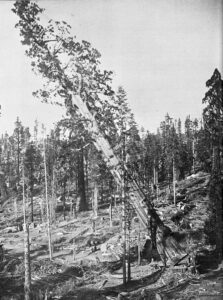
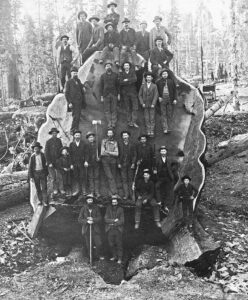 If you have ever wondered about the stupid things people can do, consider this. Most people have heard about the Redwoods in California. Trees just seem to grow much bigger in California, and if you have ever toured the Redwood National and State Parks, you will know what I mean. There is also a Sequoia National Park, and bordering that the Kings Canyon National Park, which was the location of the Mark Twain Tree…a giant sequoia tree located in the Big Stump Forest of Kings Canyon National Park. The giant tree was named after the American writer and humorist Mark Twain. The tree stood 331 feet tall and stretched 16 feet in diameter. It was an amazing tree, but there were people back East and in Europe who did not believe that trees could grow that big. In the late 1800s, travel across the country or from Europe just to see a big tree, was apparently not feasible. Now, I get that it could be difficult, and I get that the government wanted to prove that the tree existed, but what they did was no more than a display of stupidity.
If you have ever wondered about the stupid things people can do, consider this. Most people have heard about the Redwoods in California. Trees just seem to grow much bigger in California, and if you have ever toured the Redwood National and State Parks, you will know what I mean. There is also a Sequoia National Park, and bordering that the Kings Canyon National Park, which was the location of the Mark Twain Tree…a giant sequoia tree located in the Big Stump Forest of Kings Canyon National Park. The giant tree was named after the American writer and humorist Mark Twain. The tree stood 331 feet tall and stretched 16 feet in diameter. It was an amazing tree, but there were people back East and in Europe who did not believe that trees could grow that big. In the late 1800s, travel across the country or from Europe just to see a big tree, was apparently not feasible. Now, I get that it could be difficult, and I get that the government wanted to prove that the tree existed, but what they did was no more than a display of stupidity.
So, the solution was hatched. In 1891, the US Army arrived in California. Their mission was simple. Cut down 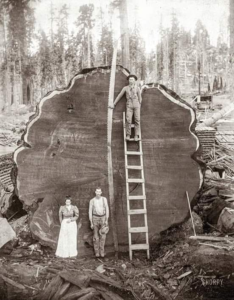 the famous Mark Twain tree so that slices of it could be sent to the American Museum of Natural History. In what is now Kings Canyon National Park, soldiers approached the giant sequoia tree and promptly cut it down. The tree, well known as it was, inspired wonder and doubt from those who had heard about it. Slices of the Mark Twain Tree were sent back to the East Coast and Europe, where it was displayed at museums in New York and London.
the famous Mark Twain tree so that slices of it could be sent to the American Museum of Natural History. In what is now Kings Canyon National Park, soldiers approached the giant sequoia tree and promptly cut it down. The tree, well known as it was, inspired wonder and doubt from those who had heard about it. Slices of the Mark Twain Tree were sent back to the East Coast and Europe, where it was displayed at museums in New York and London.
The project took 13 days and was carried out by lumbermen Bill Mills and SD Phips, with assistance from Barney and John Lukey. The tree was later shipped to the American Museum of Natural History in New York and the British Museum in London at the expense of Collis P Huntington, the president of the Southern Pacific Railroad. I suppose it is easy enough to understand why people couldn’t believe the huge trees were real. And for the Sequoia trees, even though the Sequoia National Park was established in 1890, access to the sequoia groves was difficult and the existence of such large trees was not widely believed at the time. I suppose some people might think that could justify the actions of the US Army and the US government, but to me it was a travesty, and a complete display of stupidity. So, to prove the tree could grow that big, they killed it, so they couldn’t see how big it could really grow. All to prove a point, 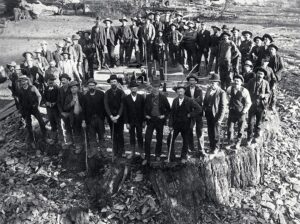
 because there were those who thought the story was bogus.
because there were those who thought the story was bogus.
Today, you can see the Mark Twain stump, and the other remains of the tree, which are preserved as part of the Big Stump Picnic Area in Kings Canyon National Park. The stump is near the entrance to Grant Grove. The stump stands there as a monument to the stupidity of some men.
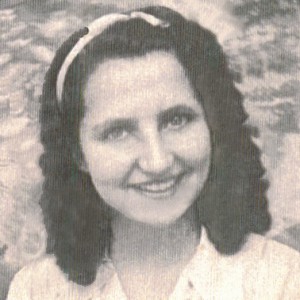
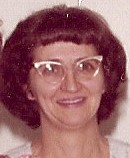 My aunt, Deloris “Dee” Johnson was always such a cheerful, fun-loving person. My sisters and I loved when she would come over to visit our mom, her sister, Collene Spencer. I especially loved her laugh. It was infectious and contagious. Aunt Dee left us far too soon, when she contracted Brain Cancer. She was just 65 years old. That was a very sad time, because we would not see her beautiful, smiling face for a long time…until we see her again in Heaven. Aunt Dee loved life, and always looked forward to the next day, and the next adventure. She had a way of inventing fun, and everyone around her benefitted.
My aunt, Deloris “Dee” Johnson was always such a cheerful, fun-loving person. My sisters and I loved when she would come over to visit our mom, her sister, Collene Spencer. I especially loved her laugh. It was infectious and contagious. Aunt Dee left us far too soon, when she contracted Brain Cancer. She was just 65 years old. That was a very sad time, because we would not see her beautiful, smiling face for a long time…until we see her again in Heaven. Aunt Dee loved life, and always looked forward to the next day, and the next adventure. She had a way of inventing fun, and everyone around her benefitted.
When she was a kid, there were no video games, and while television was a thing, not everyone had one. Even if they did, kids did not spend hours watching television. Kids went and played outside. They played games like kick the can, hide and seek, blind man’s bluff, and many others, I’m sure. Basically, if it was daylight, and their chores were done, kids played outside. Aunt Dee one time got out a big trench coat and she and my mom, her sister, Collene Spencer, did a little “flying” in the wind. They had a blast. Aunt Dee once learned a new dance in school and upon her arrival home, immediately taught it to her siblings. I think she might have been a great schoolteacher. She loved kids and loved to teach things to others.
Aunt Dee was George and Hattie Byer’s, my grandparents, third child and third daughter. Later she would have 8 siblings, two brothers and six sisters. While Aunt Dee was very loving and kind, she did not take kindly to anyone picking on her family, and was known to tell a few people off, if they got on the wrong side of her. Nevertheless, for the most part, she was a quiet, sweet mannered person, and she was loved by all who knew her. She loved doing things for her family, like catching fish at the river, and putting them in a wading pool for the other kids 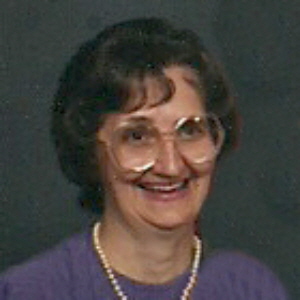
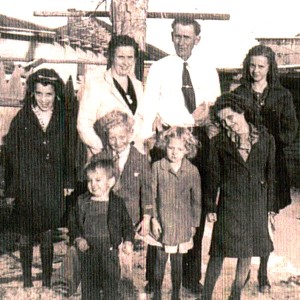 in the family to enjoy. She bought a piano for the family for $35.00, and it was in her mom’s house until her passing. Grandma really enjoyed that piano. She could actually play is a little. Her grandkids “played” it too, but I’m sure Grandma didn’t enjoy that very much at all. In fact, I’m sure that was considered more like “pounding” on it than actually playing it. It was probably pure torture. Whether Grandma love the noise or not, she did love the gift from her daughter. Today would have been my Aunt Dee’s 93rd birthday. Happy birthday in Heaven, Aunt Dee. We love and miss you very much.
in the family to enjoy. She bought a piano for the family for $35.00, and it was in her mom’s house until her passing. Grandma really enjoyed that piano. She could actually play is a little. Her grandkids “played” it too, but I’m sure Grandma didn’t enjoy that very much at all. In fact, I’m sure that was considered more like “pounding” on it than actually playing it. It was probably pure torture. Whether Grandma love the noise or not, she did love the gift from her daughter. Today would have been my Aunt Dee’s 93rd birthday. Happy birthday in Heaven, Aunt Dee. We love and miss you very much.
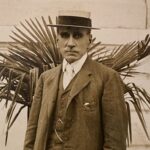
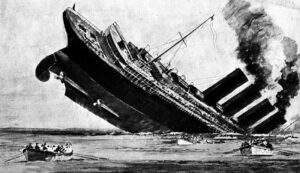 Born in Uruguay 1840, Ramon Artagaveytia was an Argentinian businessman. Even in 1840, businessmen had a need to travel periodically. That is why Artagaveytia found himself on board the ship America when it sank in December 1871. I’m sure the situation was absolutely terrifying, but Artagaveytia, became one of just 65 passengers to survive the disaster. He survived, only by jumping into the water and swimming to safety. I’m sure he felt very fortunate to survive his ordeal, but that is not to say that he was not traumatized. For years, Ramon Artagaveytia, was terrified of travel. Still, while he may have limited his travel, it was still essential at times.
Born in Uruguay 1840, Ramon Artagaveytia was an Argentinian businessman. Even in 1840, businessmen had a need to travel periodically. That is why Artagaveytia found himself on board the ship America when it sank in December 1871. I’m sure the situation was absolutely terrifying, but Artagaveytia, became one of just 65 passengers to survive the disaster. He survived, only by jumping into the water and swimming to safety. I’m sure he felt very fortunate to survive his ordeal, but that is not to say that he was not traumatized. For years, Ramon Artagaveytia, was terrified of travel. Still, while he may have limited his travel, it was still essential at times.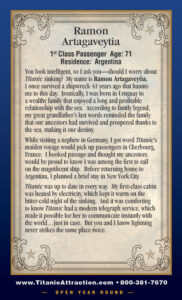
All that changed in 1912, when he wrote a letter to one of his cousins. In his letter, Artagaveytia, expressed relief, saying, “At last I will be able to travel, and, above all, I will be able to sleep calm. The sinking of the America was terrible!… Nightmares keep tormenting me. Even in the most quiet trips, I wake up in the middle of the night with terrible nightmares and always hearing the same fateful word: ‘Fire! Fire! Fire!’… I have even gotten to the point where I find myself standing in the deck with my lifebelt on….”
Artagaveytia was returning to the Americas, following a visit with his nephew in Berlin. As it turned out, the ship that finally put his mind at ease, was the “unsinkable” Titanic. When Artagaveytia arrived at Titanic, he was awed by its luxury. Everyone who saw Titanic was awed by its luxury. For Artagaveytia, one of Titanic’s greatest features was the fact that the ship had telegram capabilities. The promise of instant communication should a crisis arise, brought Artagaveytia great comfort.
Of course, as we all now know, Titanic would not be the ship that would make him safe. Titanic was simply not “unsinkable” because no ship is unsinkable. Titanic would hit that iceberg hiding in the darkness on April 14, 1912, and it would sink, in the early hours of April 15, 1912. Artagaveytia was reportedly seen on one of the decks of Titanic with two fellow passengers, looking as though he wasn’t concerned about the ship actually 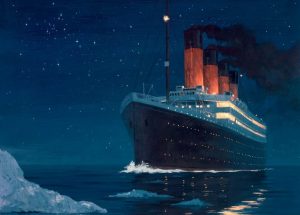
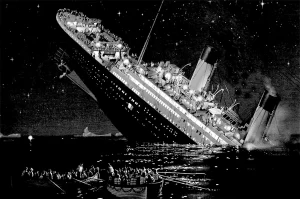 sinking. He had accepted the story that so many people had believed…that somehow, this ship was “unsinkable.” Somehow, he and many others trusted the story above what should have been understood a known fact…that any ship can sink. This time, Artagaveytia would not escape. Artagaveytia’s body was found in the North Atlantic roughly one week after the ship sank to the bottom of the sea.
sinking. He had accepted the story that so many people had believed…that somehow, this ship was “unsinkable.” Somehow, he and many others trusted the story above what should have been understood a known fact…that any ship can sink. This time, Artagaveytia would not escape. Artagaveytia’s body was found in the North Atlantic roughly one week after the ship sank to the bottom of the sea.
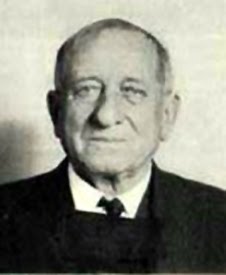
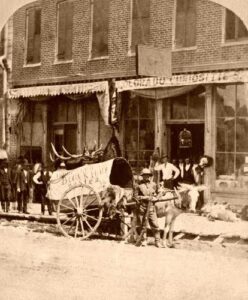 Louis H Blonger was born in Swanton, Vermont, on May 13, 1849. He was the eighth of 13 children. His father, Simon Peter Belonger, was a stonemason born in Canada of French ancestry. His mother, Judith Kennedy, was raised in an orphanage in Nenagh, County Tipperary, Ireland. The Belonger family migrated from Vermont to the lead mining village of Shullsburg, Wisconsin, when Lou was five years old. Sadly, his mother died in 1859, and Lou was sent to live with his older sister and her husband for a few years. It was around that time, that Blonger began using a shortened version of the family name (omitting the first “e”), as most of his brothers did.
Louis H Blonger was born in Swanton, Vermont, on May 13, 1849. He was the eighth of 13 children. His father, Simon Peter Belonger, was a stonemason born in Canada of French ancestry. His mother, Judith Kennedy, was raised in an orphanage in Nenagh, County Tipperary, Ireland. The Belonger family migrated from Vermont to the lead mining village of Shullsburg, Wisconsin, when Lou was five years old. Sadly, his mother died in 1859, and Lou was sent to live with his older sister and her husband for a few years. It was around that time, that Blonger began using a shortened version of the family name (omitting the first “e”), as most of his brothers did.
The Civil War broke out when Lou was just 15 years old. While he was technically just a boy, Lou enlisted in the Union Army anyway. While he was a soldier, someone must have known that he was quite young, and he soon found himself playing a musical instrument called a fife, helping to keep the marching pace of the soldiers. A Fifer was a common job for those boys who were too young to fight. When the war ended, Lou joined up with his older brother, Sam. The boys headed west hoping to make their fortunes in the many Colorado, Utah, and Nevada mining camps. As they were about to find out, mining isn’t the easiest way to make “your fortune” and so they found themselves moving from camp to camp, taking various jobs working in saloons and mines while doing a little prospecting, plenty of gambling, and practicing several con games in cities across the West, from Deadwood, South Dakota, to Silver City, New Mexico, and on to San Francisco, California. For a short time, Lou and Sam even served as lawmen in Albuquerque, New Mexico, where they were said to have provided protection for Doc Holliday and Wyatt Earp.
The brothers could be found in Denver, Colorado by the 1880s, where they ran a saloon on Larimer Street and later on Stout Street. Within ten years, they had become wealthy from their investments in mining claims, as well as their profits from their popular Denver saloons. Their saloons catered to gamblers and provided “painted ladies” for their customers, but it was far more due to their various games of fraud and graft practiced on many 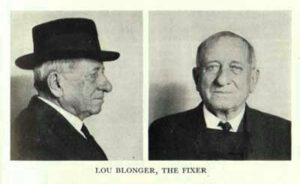 a hapless miner, that brought in the most money for the pair. While in Denver, they practiced their cons widely, in open competition with the well-known Soapy Smith Gang. Eventually, the Blonger brothers took over control as the “Kingpins” of the Denver underworld, when Soapy Smith moved on in 1896. They consolidated the city’s competing gangs of confidence men into a single organization.
a hapless miner, that brought in the most money for the pair. While in Denver, they practiced their cons widely, in open competition with the well-known Soapy Smith Gang. Eventually, the Blonger brothers took over control as the “Kingpins” of the Denver underworld, when Soapy Smith moved on in 1896. They consolidated the city’s competing gangs of confidence men into a single organization.
Operating their “business” as a “big store” con, or fake betting house, central facilities were established, complete with betting windows, chalkboards for race results, and ticker-tape machines. Here, the gang members would convince unsuspecting customers to put up large sums of cash to secure the delivery of promised stock profits or winning bets on horse races. It was this practice that is portrayed in the movie, The Sting. Lou also had several men working for him who profited as pickpockets, shell-game experts, and other small-time con games. Lou’s operation was so tight that no one could operate in the city without gaining his permission and “donating” a share of their proceeds to him. Not satisfied with their original influence, they began to wield their power by influencing elections and political appointments to protect their racket and shield their gang members from prosecution.
Blonger added a second-in-command, named Adolph W “Kid” Duff in 1904. Duff was an experienced hand, having long been a member of several other Colorado gangs and well known as a gambler, opium dealer, and pickpocket. With this addition, the profits of the “organization” increased, and by 1920, Lou Blonger had grown so powerful that many said he “owned” the city of Denver. He was said to be able to fix any arrest with a phone call and was making thousands of illegal dollars a year in his extensive confidence games. Lou even had a private telephone line in his office that ran directly to the chief of police…who was also corrupt. Lou had become known as “The Fixer” and had become one of the leaders of the longest-running confidence rings in the American West. Nevertheless, even this was a doomed enterprise.
Blonger had been a decent young man turned successful criminal for decades, when in 1922, it all ended. Di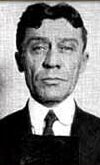
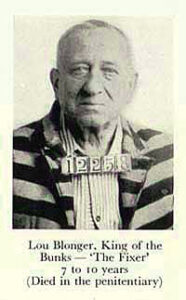 strict Attorney Philip S Van Cise circumvented the corrupt Denver politicians and established his own “secret force” of local citizens. They were funded by private donations, an Van Cise’s men were able to arrest 33 confidence men, including Louis Blonger and “Kid” Duff. The trial was big news and highly publicized. The people were tired of the corruption, and upon their conviction, Louis Blonger and many other gang members were sentenced to prison in Cañon City, Colorado. Lou Blonger and “Kid”, Duff received sentences of seven to ten years, nevertheless, Blonger would again escape hi “due punishment” when just five months after going to prison, he died on April 20, 1924, at the age of 74. Duff, in the meantime, was out on bond pending another court case, when he committed suicide. You might be wondering what Lou’s older brother Sam was doing at this time. Sam had died some ten years earlier.
strict Attorney Philip S Van Cise circumvented the corrupt Denver politicians and established his own “secret force” of local citizens. They were funded by private donations, an Van Cise’s men were able to arrest 33 confidence men, including Louis Blonger and “Kid” Duff. The trial was big news and highly publicized. The people were tired of the corruption, and upon their conviction, Louis Blonger and many other gang members were sentenced to prison in Cañon City, Colorado. Lou Blonger and “Kid”, Duff received sentences of seven to ten years, nevertheless, Blonger would again escape hi “due punishment” when just five months after going to prison, he died on April 20, 1924, at the age of 74. Duff, in the meantime, was out on bond pending another court case, when he committed suicide. You might be wondering what Lou’s older brother Sam was doing at this time. Sam had died some ten years earlier.

